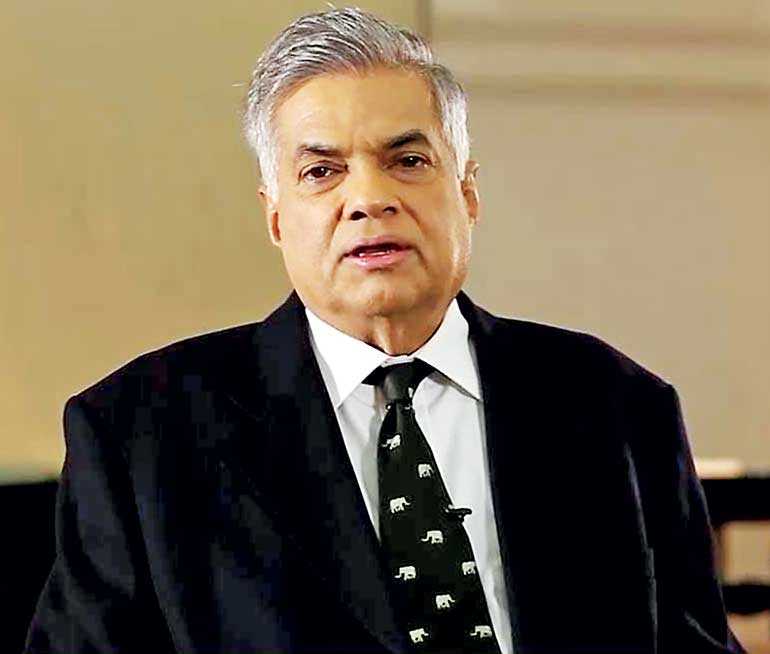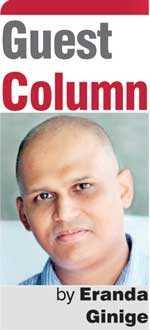Tuesday Feb 24, 2026
Tuesday Feb 24, 2026
Tuesday, 10 April 2018 00:15 - - {{hitsCtrl.values.hits}}

The vote of No-Confidence against the Prime Minister of Sri Lanka is both a success and a failure for democracy. Democracy is the rule of the people, by the people, for the people. The job of the Members of Parliament is simply to represent the people and the people’s choice. Nothing more; nothing less.
The motion rightfully was against the Prime Minister, based primarily on his judgment and behaviour in the corruption case in the issuance of Treasury bonds in 2015 (commonly known as the Central Bank bond scam). It was not against the current Government necessarily, nor was it against him as the Leader of his political party (UNP). It was a mistake to conflate the motion with the UNP’s internal politics.
A vote of No-Confidence is an important tool used in representative democracy. A tool which must be used sincerely and frequently. It’s the tool which allows to change elected representatives, in-between elections, thus constantly keeping them under the people’s rule.
The debate
The best part about the No-Confidence Motion was its debate. The worst part of it was the MPs already announcing their vote before the debate.
The debate is the fundamental prerequisite for democratic decision making. Its purpose is to propose a specific action and allow all the stakeholders (in this case the people’s representatives) to debate in favour of and against the subject. If done openly, scientifically and methodically it will bring out all the information relevant to the subject, disprove falsehoods and confirm the true facts.
If you followed the full-day debate, it is more than enough to understand the Prime Minister’s faults with respect to the motion. But as usual, the debate was muddled with irrelevant talks, personal propaganda and constant background noise. In good democratic practice, the MPs should sincerely try to debate on the subject with the sole intention of understanding the truth. That’s their ‘representative responsibility’ for the people.
The Speaker of the Parliament should first of all organise a workshop for the MPs to explain the meaning and purpose of ‘Point of Order’ in a debate. I sometimes wonder if some of those MPs had even taken part in a school debate. A point of order is used to clarify specific procedures in effect. It’s not an excuse to interrupt a speech just to utter some irrelevant nonsense. Every minute wasted in the Parliament is a waste of the people’s money.
The constituency
It was utterly ridiculous how most TV and radio channels, newspapers and online news sites only focused on “who is voting how”. The task of mass media is to educate the people with relevant information about the motion. The Joint Opposition too failed to build a strong people’s case in this regard. It was largely seen as a rushed attempt led by a few MPs without much people backing. They failed to inform the people on the purpose and content of the motion.Instead, the pre-vote days became a circus of MPs meeting among themselves, colluding with the PM, and secret rendezvous with the President simply to collate votes based on their personal and party interests. Where’s democracy in that?
The priority of all MPs should’ve been to go to their respective constituency and ask what the people actually think and want. Their job is to represent the people’s choice in the Parliament, not their own whims and fancies. That’s how representative democracy should work.
If the Prime Minister indeed has the self-confidence and the confidence of the people, he needn’t have to worry. The whole saga of desperate MPs running around collecting votes itself was evident enough to prove the lack of confidence in and of the Prime Minister.
The vote
In a democratic country, identity-based politics is a disgrace. Democracy cannot function if the people are systematically divided based on ethnicity and religion. The voting decision of the political parties, Tamil National Alliance (TNA) and the Muslim Congress is yet another instance of how they undermine democracy in the Republic of Sri Lanka.
Each and every Member of Parliament gives an oath to uphold the Constitution of the Republic. When they are sworn in to the Parliament they assume a higher responsibility to the Republic. Their political party becomes secondary. Sadly, most MPs don’t understand this. The MPs of the UNP acted as if this was a threat to their party leadership and their own power rather than sincerely addressing the central issue of the Prime Minister’s role in the Central Bank bond issue corruption case.
The motion had nothing to do with the Sinhalese, the Tamils or the Muslims. The impact of the bonds issue corruption case is not on any single ethnic group but falls on all citizens equally. But the TNA repulsively abused the no-confidence motion to further their own ethnic political agenda. Every MP has the freedom to vote based on their best judgment. It’s one thing to vote against the motion if you genuinely believe the PM did nothing wrong, but selling your vote on unrelated preconditions is a grave crime.
Instead of acting in the best interest of the Republic, they hijacked the motion, and reportedly made PM into agreeing to a 10-point, one-sided proposal in return of their votes. Where is democracy in that? Where is equality in that? And by desperately agreeing to their demands, the Prime Minister undermined Parliamentary democracy again proving his culpability in the Central Bank corruption case.
There is no win or lose in democracy. All there is, is the people’s choice. The question we, the people, must ask now is: Did our so-called representatives act in the best interest of us, the people? Or did they act in their own political self-interests? I think the answer is clear. It is time the people of Sri Lanka take our sovereign power back to our hands. It is time we bring a full-on vote of No-Confidence against this old, obsolete, corrupt system and its maniacal players, and build a new democracy suited for the 21st century and beyond.
(Eranda Ginige is the Ambassador for Democracy Earth to Sri Lanka, and the pioneer in introducing social entrepreneurship to Sri Lanka. To schedule a free speech on ‘Liquid Democracy – Democracy for the 21st Century,’ please write to him [email protected].)